In 2025, futures trading is dominated by platforms that prioritize automation, speed, and reliability. With markets moving faster than ever, traders now rely heavily on tools that support algorithmic strategies, ultra-low latency execution, and robust hosting solutions like VPS.
Here’s a quick overview of the top platforms for futures trading this year:
- QuantVPS: High-performance VPS hosting with sub-millisecond latency and 100% uptime, optimized for running automated strategies seamlessly.
- NinjaTrader: A favorite for retail futures traders, offering powerful automation tools like NinjaScript and ultra-low latency execution.
- Quantower: Multi-asset trading platform with advanced charting and API automation for futures, forex, crypto, and equities.
- TradeStation: Known for its EasyLanguage scripting and fast execution, ideal for active traders.
- Sierra Chart: Precision-focused platform with low-latency execution and advanced charting for scalpers and high-frequency traders.
- MultiCharts: Designed for professional traders, supports PowerLanguage and C# scripting for custom strategies.
- Optimus Futures: Connects traders to multiple platforms and brokers like Rithmic and CQG for high-performance execution.
- Tickblaze: Specializes in quantitative research and portfolio testing for professional algorithmic traders.
- StrategyQuant X: AI-driven platform for automatic strategy generation and optimization.
- Bookmap: Visualizes order flow with heatmaps, ideal for short-term price action analysis.
- Jigsaw Trading: Tailored for order flow analysis and tape reading, perfect for scalpers.
- ATAS: Focuses on volume and order flow analysis with tools like footprint charts.
- MetaTrader 4 (MT4): Supports automated trading via Expert Advisors (EAs) and is widely used for forex and futures.
- MetaTrader 5 (MT5): An upgraded version of MT4 with faster backtesting and multi-asset support.
- Interactive Brokers (IBKR): Offers institutional-grade tools, global market access, and robust API support.
- MotiveWave: Known for advanced Elliott Wave analysis and harmonic pattern tools.
- Tradovate: A cloud-based platform offering fast, reliable execution and mobile access.
Quick Comparison
| Platform | Automation Support | Asset Classes | Key Features | Pricing (Starting From) |
|---|---|---|---|---|
| QuantVPS | VPS for all platforms | N/A | 0-1ms latency, 100% uptime | $59.99/month |
| NinjaTrader | NinjaScript (C#) | Futures, Forex | Ultra-low latency, deep broker integration | Free (limited) |
| Quantower | API automation | Multi-asset | Advanced charting, broker connectivity | $50/month |
| TradeStation | EasyLanguage | Futures, Stocks, Options | Fast execution, backtesting | $99/month |
| Sierra Chart | C++ scripting | Futures | Professional-grade tools, low latency | $26/month |
| MultiCharts | PowerLanguage, C# | Futures, Equities | Advanced automation, backtesting | $99/month |
| Optimus Futures | Platform-dependent | Futures | High-speed execution, multiple platforms | Brokerage fees apply |
| Tickblaze | Multi-broker APIs | Multi-asset | Quantitative research tools | Custom pricing |
| StrategyQuant X | AI-driven automation | Futures, Forex | Strategy generation, optimization | Custom pricing |
| Bookmap | Semi-automated | Futures | Order flow visualization | $99/month |
| Jigsaw Trading | Limited automation | Futures | Tape reading, DOM tools | $579 (lifetime license) |
| ATAS | Analysis-focused | Futures | Volume, order flow analysis | $69/month |
| MetaTrader 4 | Expert Advisors (MQL4) | Forex, CFDs | Automation tools, broker support | Free (broker-dependent) |
| MetaTrader 5 | Expert Advisors (MQL5) | Multi-asset | Faster backtesting, modern scripting | Free (broker-dependent) |
| Interactive Brokers | API support | Global multi-asset | Institutional-grade tools, global access | $0 monthly fee (tiered commissions) |
| MotiveWave | Full automation | Multiple assets | Elliott Wave, harmonic tools | $29/month |
| Tradovate | Limited automation | Futures | Cloud-based, mobile access | $0 monthly fee (commission-based) |
The right platform depends on your trading goals. Scalpers may prefer Sierra Chart or Jigsaw Trading for speed and order flow. Algorithmic traders might opt for NinjaTrader, TradeStation, or MultiCharts for advanced scripting. Those managing multiple asset classes could benefit from Quantower or Interactive Brokers. No matter your choice, reliable hosting like QuantVPS ensures your strategies run smoothly.
ULTIMATE Futures Trading Course (with ZERO experience)
1. QuantVPS: High-Performance VPS for Futures Trading
In the fast-paced world of automated trading, having a solid infrastructure isn’t just helpful – it’s essential. QuantVPS delivers a high-performance hosting environment tailored for futures traders who rely on speed and reliability to execute their strategies effectively. Let’s take a closer look at the features that make QuantVPS a strong choice for high-frequency trading.
VPS Hosting Features and Performance Specifications
QuantVPS offers enterprise-level VPS hosting with configurations ranging from 4 cores and 8GB of RAM to dedicated servers boasting 16+ cores and 128GB of RAM. Each plan is equipped with NVMe storage, ensuring lightning-fast data access – critical for algorithms that need to process real-time market data and execute trades in milliseconds.
The network infrastructure supports 1Gbps+ connectivity across standard plans, while dedicated servers can reach speeds of up to 10Gbps. This level of bandwidth ensures your trading systems won’t face slowdowns, even during periods of heavy market activity.
All plans include unmetered bandwidth, so you don’t have to worry about data limitations when backtesting strategies or running multiple automated systems. QuantVPS operates on Windows Server 2022, providing a stable and reliable foundation for your futures trading applications.
Platform Compatibility and Integration Capabilities
QuantVPS is compatible with popular trading platforms like NinjaTrader, MetaTrader, and TradeStation. With root access included, traders can install custom software, indicators, or any additional tools needed to optimize their strategies.
For those who rely on multiple screens for market analysis, QuantVPS offers multi-monitor support. The VPS Pro plan supports up to 2 monitors, VPS Ultra accommodates up to 4, and higher-tier plans allow for up to 6 monitors – perfect for keeping an eye on multiple markets simultaneously.
Latency Optimization and Uptime Guarantees
Speed is everything in futures trading, and QuantVPS delivers with 0-1ms latency to major exchanges. This ultra-low latency gives traders a critical edge in executing trades faster than the competition. Additionally, the platform includes DDoS protection and automatic backups, ensuring your systems remain secure and operational even during cyberattacks or hardware issues.
QuantVPS guarantees 100% uptime, thanks to its redundant infrastructure and 24/7 monitoring. For traders running automated strategies around the clock, this level of reliability is indispensable. Real-time performance monitoring tools are also available, allowing you to track your VPS’s health and address any potential problems before they affect your trading.
Pricing Plans and Resource Allocation Options
QuantVPS offers a range of plans to suit different trading needs, with annual billing options that provide cost savings. Here’s a breakdown:
- VPS Lite: Starting at $59.99 per month (or $41.99/month with annual billing), this plan is ideal for running basic automation on 1-2 charts.
- VPS Pro: Priced at $99.99 per month (or $69.99/month annually), it handles 3-5 charts and includes multi-monitor support.
- VPS Ultra: At $189.99 per month (or $132.99/month annually), this plan offers 24 cores and 64GB of RAM, making it perfect for complex automated strategies on 5-7 charts.
- Dedicated Server: For maximum performance, this plan costs $299.99 per month (or $209.99/month annually) and includes 128GB of RAM and 2TB+ NVMe storage.
For traders requiring even more power, the Performance+ plans offer enhanced specifications. The Dedicated+ Server, priced at $399.99 per month (or $279.99/month annually), is designed for professional-grade workloads, supporting 7+ charts and handling intensive algorithmic trading seamlessly.
2. NinjaTrader
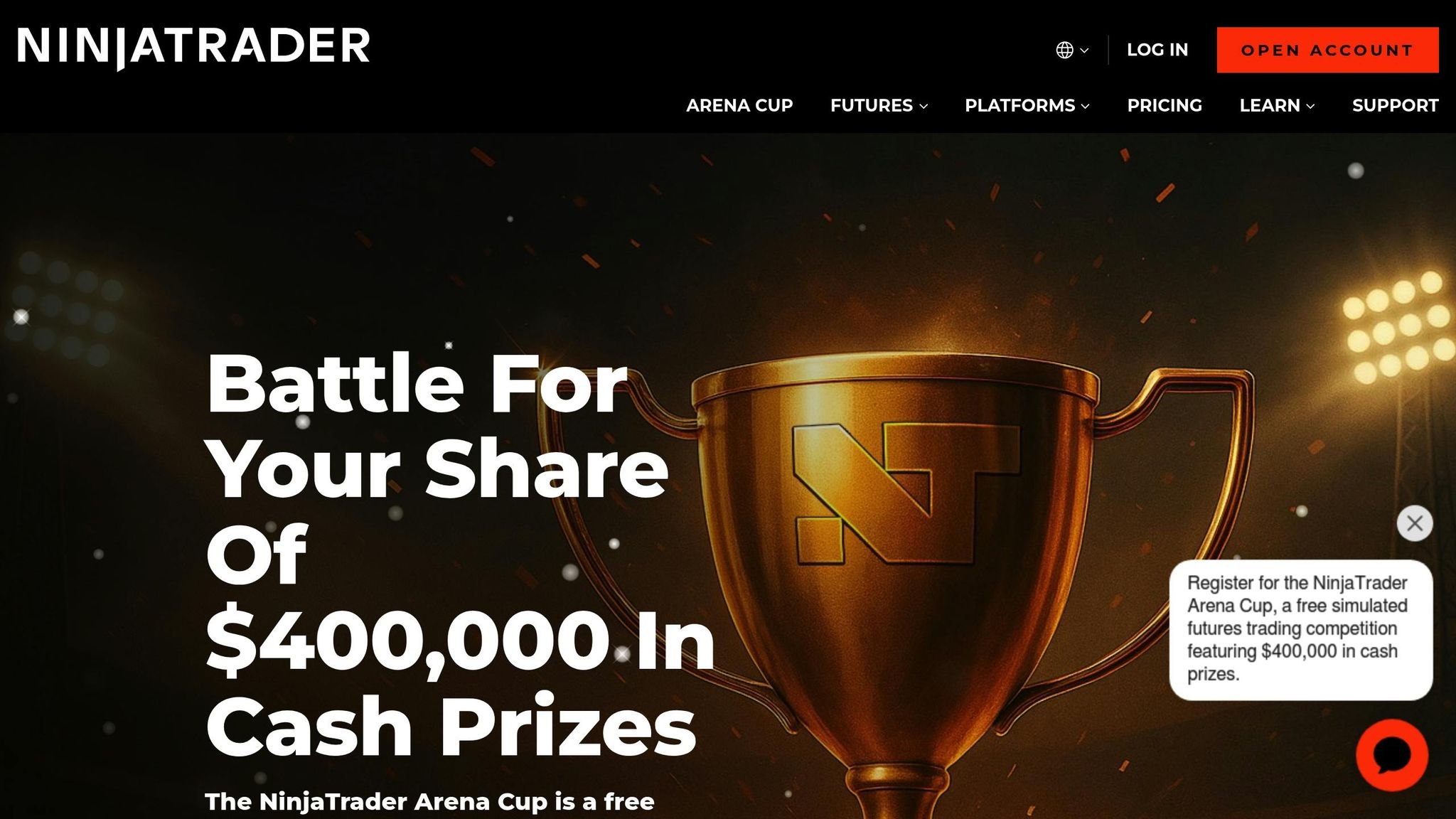
Known as the "#1 futures broker" and celebrated as "Best for Dedicated Futures Traders", NinjaTrader has built a reputation as a go-to platform for retail futures and algorithmic trading, with over 1.9 million users. Here’s a closer look at what makes it stand out.
Automation Features (Native Scripting, APIs, and Integrations)
The NinjaTrader Desktop platform simplifies trading decisions by automating backtested entry and exit rules, executing them seamlessly on live or simulated data. This approach helps traders avoid emotional decision-making during critical moments.
Its Automated Trade Management (ATM) system is a standout feature, capable of submitting stop-loss and take-profit orders within milliseconds. For added flexibility, the Custom ATM Strategy Builder lets users create advanced order types like One Cancels Other (OCO), bracket orders, trailing stops, and breakeven stops.
For those looking to take automation further, the AlgoFuturesTrader (AFT) plugin is a powerful tool. It enables traders to craft custom scripts that integrate directly into the AFT8 signal execution engine, allowing them to "Build your own code and use your own rules in NinjaTrader".
Supported Asset Classes (Futures and Forex)
While NinjaTrader shines in futures trading, thanks to its strong exchange integrations, it also supports forex markets, making it a versatile choice for traders handling multiple asset classes.
Order Execution and Latency Performance
Speed is critical in trading, and NinjaTrader delivers with ultra-low latency execution through its brokerage integrations. This ensures automated strategies can respond to market changes instantly, which is essential for high-frequency trading where every millisecond counts.
Tools for Analysis and Trading Strategy Optimization
NinjaTrader equips traders with a suite of tools for in-depth analysis and strategy refinement. Its customizable charting and real-time analysis capabilities are bolstered by thousands of third-party add-ons, apps, and trading indicators. Whether you’re using a C#-based development framework or a simple point-and-click interface, the platform supports creating custom tools, apps, and automated strategies.
For those who demand precision, NinjaTrader offers specialized features like Footprint Charts for order flow trading, Tick and Range Charts for scalping, and chart pattern recognition tools. These tools provide the granular market insights needed for accurate entry and exit timing.
Another highlight is NinjaTrader’s free, unlimited simulated trading environment. This feature allows traders to practice and refine their strategies without risking real money, making it a valuable resource for both beginners and seasoned traders alike.
3. Quantower
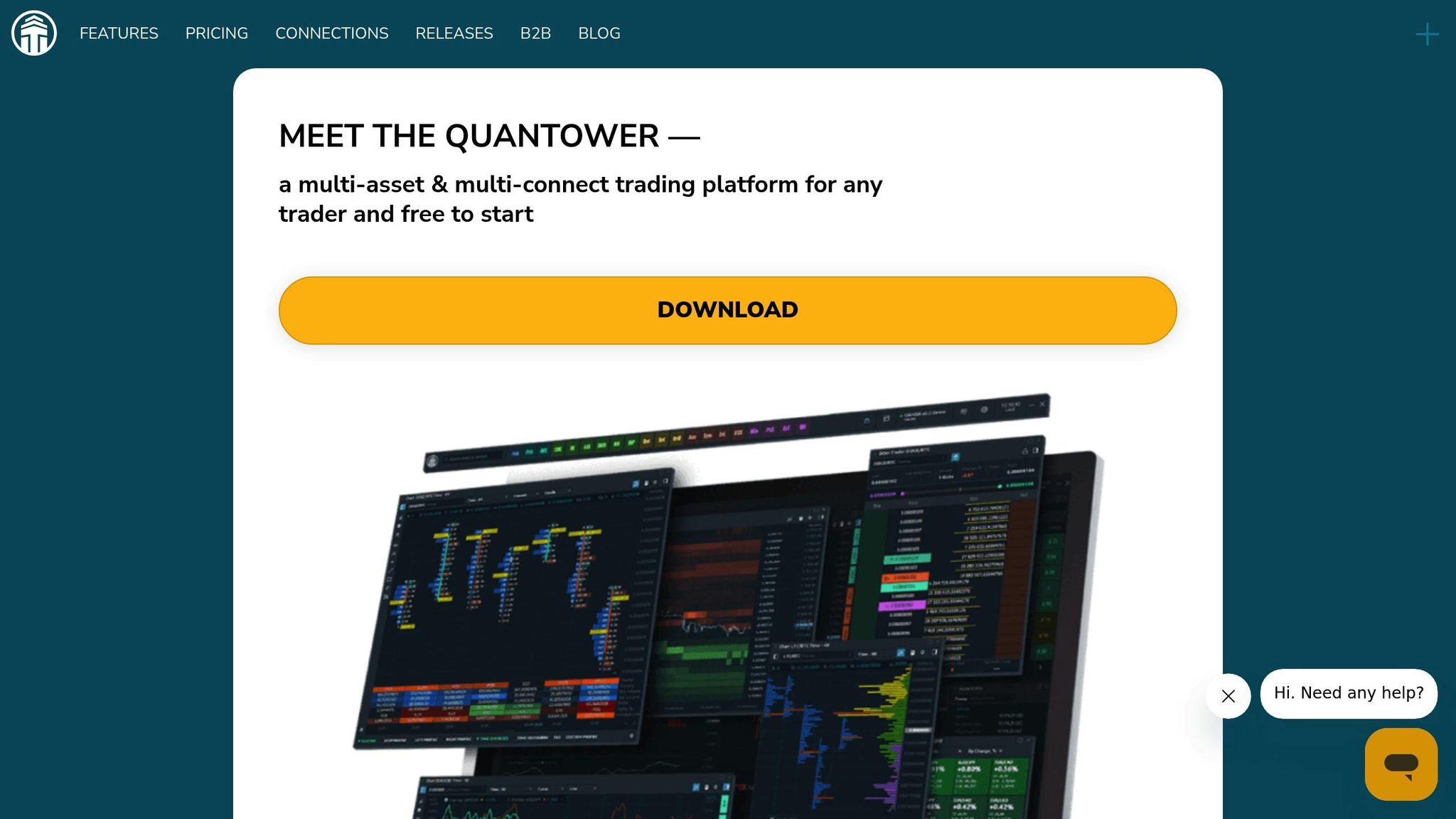
Quantower is a versatile trading terminal that brings together futures, forex, crypto, and equities in a single platform. It’s designed to simplify multi-market trading by offering seamless access to a variety of asset classes.
Supported Asset Classes (Futures, Forex, Crypto, Equities)
Quantower supports trading across futures, forex, crypto, and equities, all from one unified workspace. This integration is a game-changer for traders using cross-market strategies or hedging, as it eliminates the hassle of juggling multiple accounts and platforms. Everything you need is in one place, making the trading process smoother and more efficient.
Order Execution and Latency Performance
The platform connects to numerous brokers and data feeds, giving traders the flexibility to choose the execution venue that best aligns with their strategies. This broad connectivity helps reduce latency, a crucial factor in fast-moving markets where every millisecond counts.
Tools for Analysis and Strategy Optimization
Quantower offers advanced charting tools with customizable layouts and a wide range of technical indicators for in-depth visual analysis. The platform also supports extensive workspace customization, perfect for traders who rely on multiple monitor setups. Whether you’re into quick scalping or managing a diversified portfolio, Quantower can adapt to your trading style with ease.
4. TradeStation
TradeStation has carved out a niche for active traders who prioritize fast execution and advanced automation tools. It’s been recognized by StockBrokers.com as "Best for active futures traders and API access" and by Investopedia as "Best for Desktop Futures Trading".
Automation Features: Customization and APIs
One of TradeStation’s standout features is its EasyLanguage scripting tool, which allows traders to create custom indicators, strategies, and fully automated trading systems. On top of that, the platform offers robust APIs, enabling seamless alerts and trade execution across futures, equities, and options.
Fast Execution and Low Latency
TradeStation’s infrastructure is built to support complex automation and advanced order types, ensuring rapid and reliable trade execution. This level of performance is critical for futures traders who rely on split-second decisions.
Advanced Tools for Strategy and Analysis
TradeStation isn’t just about speed and automation – it also excels in analytics. It’s been described as a "powerhouse for charting, analytics, and trade management", giving advanced traders unparalleled control over their strategies. The platform also provides backtesting tools that let users test strategies with historical data before going live. This combination of analytics and automation makes it a favorite among quants and systematic traders looking for precision and efficiency.
5. Sierra Chart
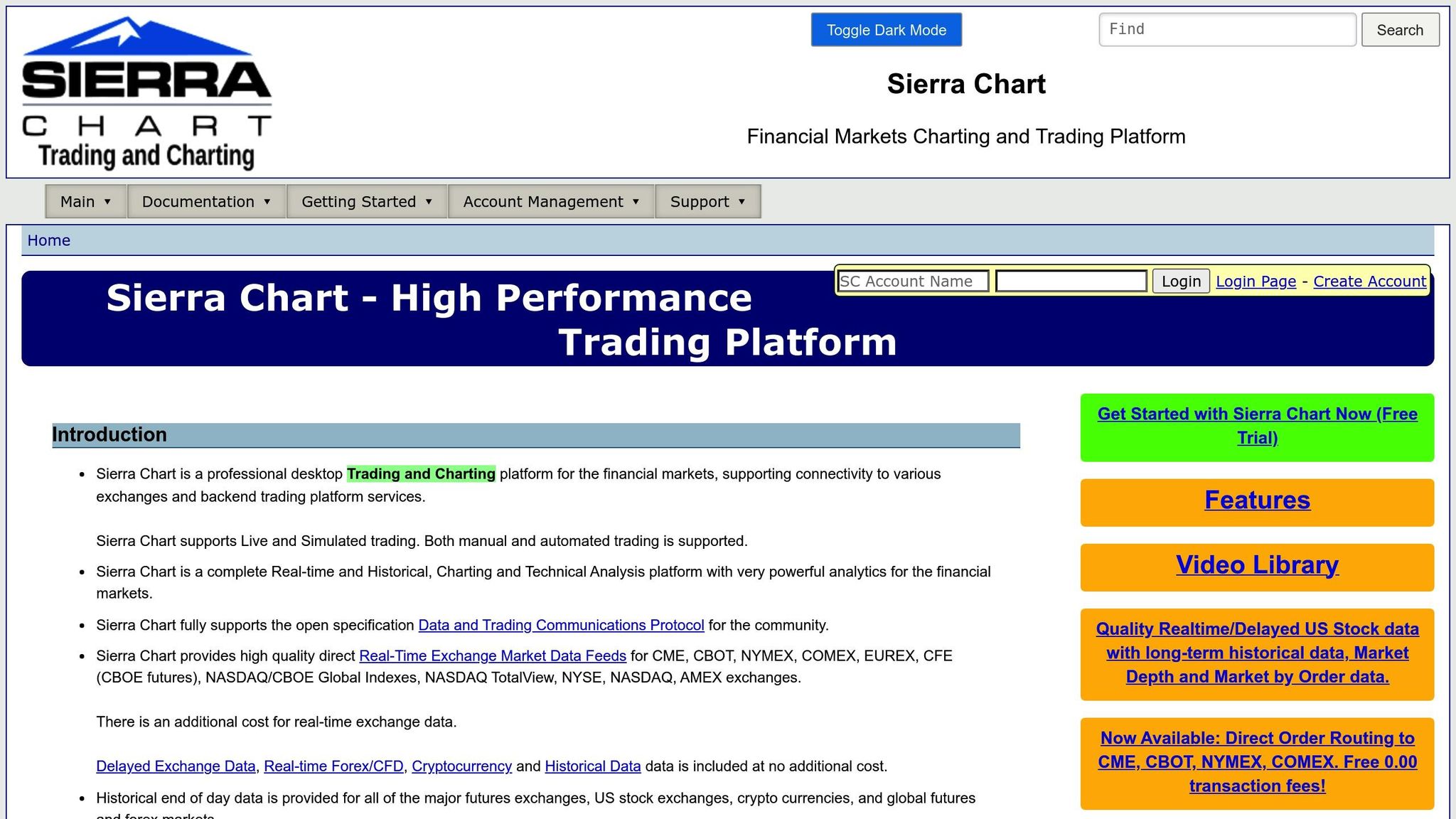
Sierra Chart is a high-performance futures trading platform designed for traders who prioritize precision and speed. Packed with professional-grade tools, it’s a go-to choice for scalpers and trading firms that need direct market access and ultra-low latency execution.
Automation Features
Sierra Chart offers a powerful automation setup, featuring a native C++ scripting environment and API support for various programming languages. It also includes advanced backtesting and strategy development tools, giving traders the ability to test and refine their approaches with ease. This strong automation framework complements the platform’s focus on fast and efficient execution.
Order Execution and Latency
With direct market access at an institutional level, Sierra Chart delivers low-latency order execution, making it ideal for high-frequency trading in dynamic markets.
Customizable Charting and Affordable Pricing
In addition to its execution capabilities, Sierra Chart provides highly customizable charting tools, allowing traders to design layouts that suit their individual strategies. At just $26 per month, it combines institutional-grade features with affordability, making it a compelling option for serious traders. Like other top-tier platforms, Sierra Chart prioritizes automation and speed – two critical elements for success in modern futures trading.
6. MultiCharts
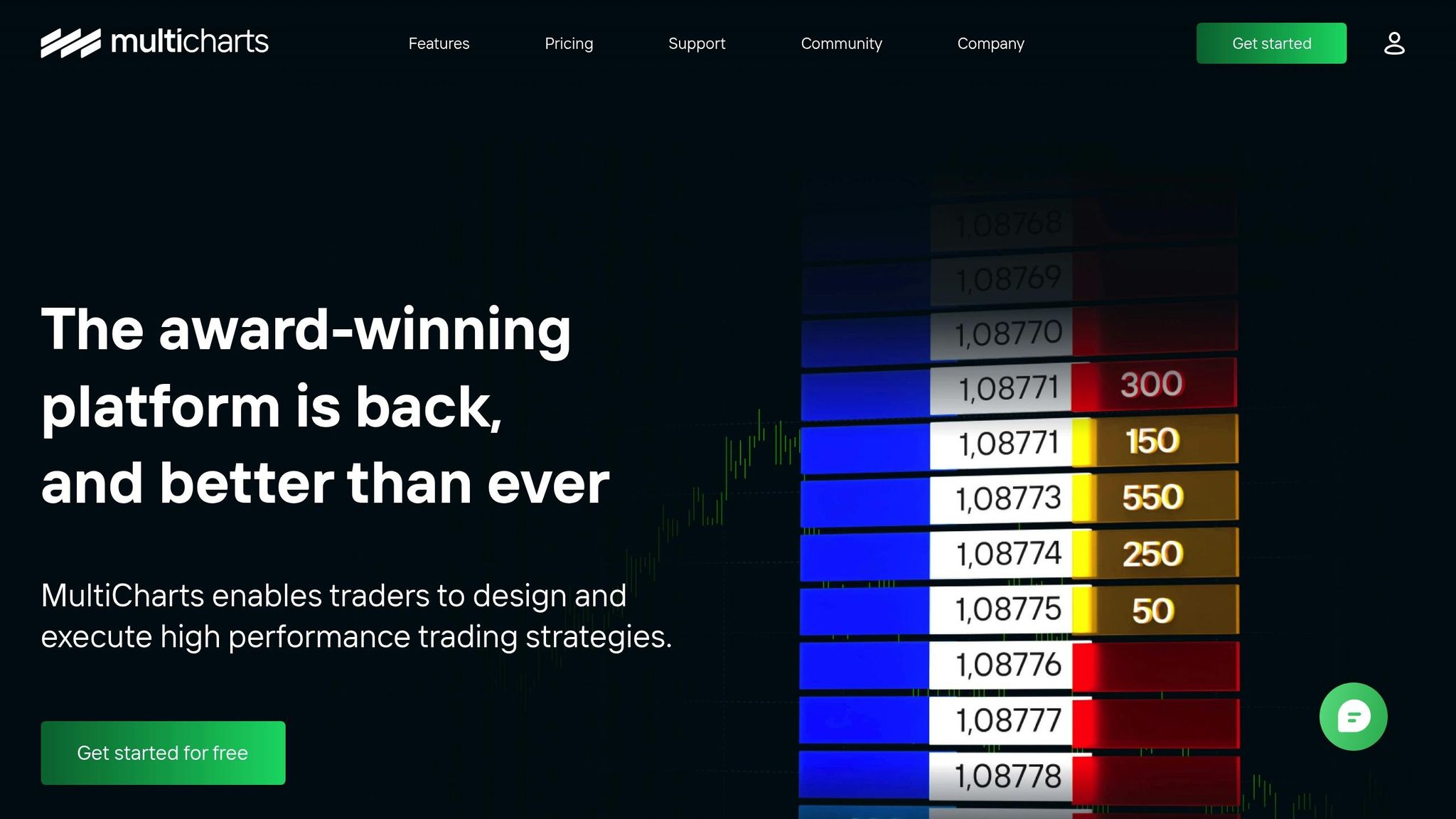
MultiCharts is a powerful platform tailored for professional futures trading. It provides traders and developers with a suite of tools designed for creating strategies and ensuring precise execution. Let’s delve into the features that make MultiCharts stand out.
Automation Features
MultiCharts leverages PowerLanguage, enabling users to craft custom indicators and strategies. For those who prefer coding in C# or VB.NET, the .NET edition integrates seamlessly with Visual Studio, supporting both 32-bit and 64-bit versions. Additionally, its API access opens the door to algorithmic trading, making it a flexible option for developers.
Supported Asset Classes
The platform supports futures, forex, and equities, bringing these asset classes together in one streamlined environment for strategy development and execution.
Order Execution and Latency Performance
Speed and accuracy are critical in futures trading, and MultiCharts delivers on both. It provides precise market data with minimal latency and executes orders within milliseconds – an essential feature for traders operating in fast-moving markets.
Tools for Analysis and Strategy Optimization
MultiCharts boasts high-definition charting, a wide range of technical indicators, and a robust backtesting system. These tools allow traders to test and refine their strategies thoroughly before going live.
The platform’s pricing starts at $99 per month for the standard version, while the .NET edition is available for $107 per month. For those looking to experiment with smaller-scale strategies, MultiCharts also supports micro futures trading.
With its advanced scripting capabilities, reliable execution, and extensive testing tools, MultiCharts is a strong choice for traders who prioritize systematic and data-driven approaches to futures trading.
7. Optimus Futures (via Rithmic / CQG)
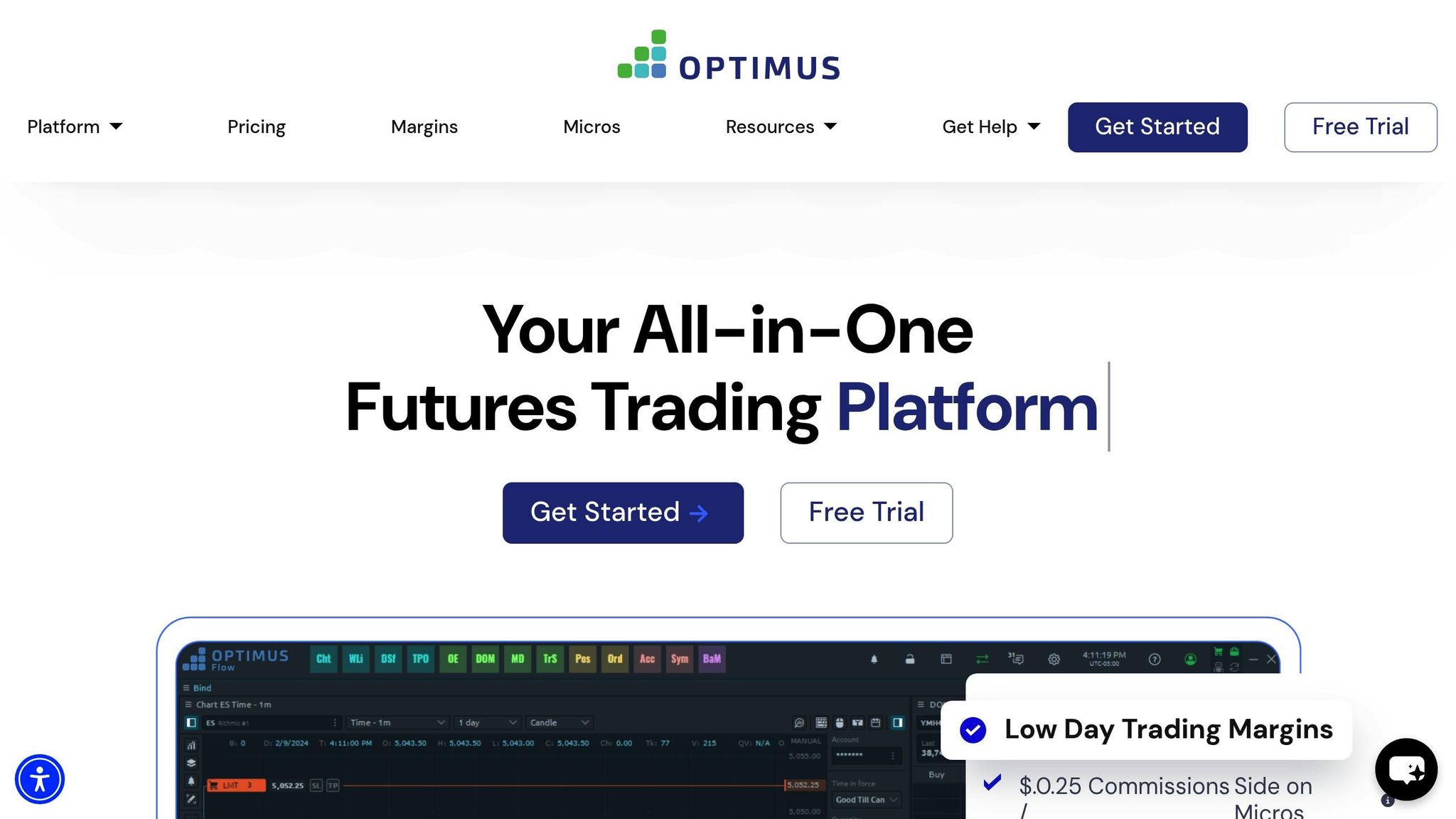
Optimus Futures serves as a brokerage hub, connecting traders to high-performance execution systems through Rithmic and CQG. Instead of relying on a single proprietary platform, it offers access to multiple trading environments, including NinjaTrader, Quantower, and its own Optimus Flow platform. This approach caters to traders seeking speed, precision, and flexibility in their trading setups.
Automation Features
Automation capabilities depend on the platform you choose. For instance, NinjaTrader supports custom strategy development and execution through its NinjaScript programming language. Quantower provides API connectivity, making it a strong choice for algorithmic trading. On the other hand, Optimus Flow is tailored specifically for futures trading, offering built-in automation tools to streamline execution.
Rithmic enhances trading with fast order routing and dependable data feeds, while CQG ensures consistent execution for professional traders. This variety of automation tools caters to diverse trading strategies and preferences.
Supported Asset Classes
The primary focus of Optimus Futures is on futures contracts. While some integrated platforms may also support other asset classes like forex or equities, futures remain at the core of its offerings.
Order Execution and Latency Performance
Optimus Futures is built on a solid institutional-grade infrastructure, ensuring fast and reliable order execution through both Rithmic and CQG. This dual-provider setup gives traders multiple connectivity options and helps maintain consistent performance, even during volatile market conditions. Features like co-location and direct exchange connections further reduce latency, offering an edge to traders who value speed.
Tools for Analysis and Trading Strategy Optimization
Through its platform integrations, Optimus Futures offers a range of tools for analysis and strategy development. NinjaTrader provides advanced charting and backtesting capabilities, ideal for refining trading strategies. Quantower delivers flexible analysis features and detailed order flow visualization for those who want deeper insights. Meanwhile, Optimus Flow is optimized for futures trading, offering tools like real-time P&L tracking, advanced order types, and integrated risk management. Together, these tools equip traders with the resources they need for both analysis and efficient execution.
8. Tickblaze
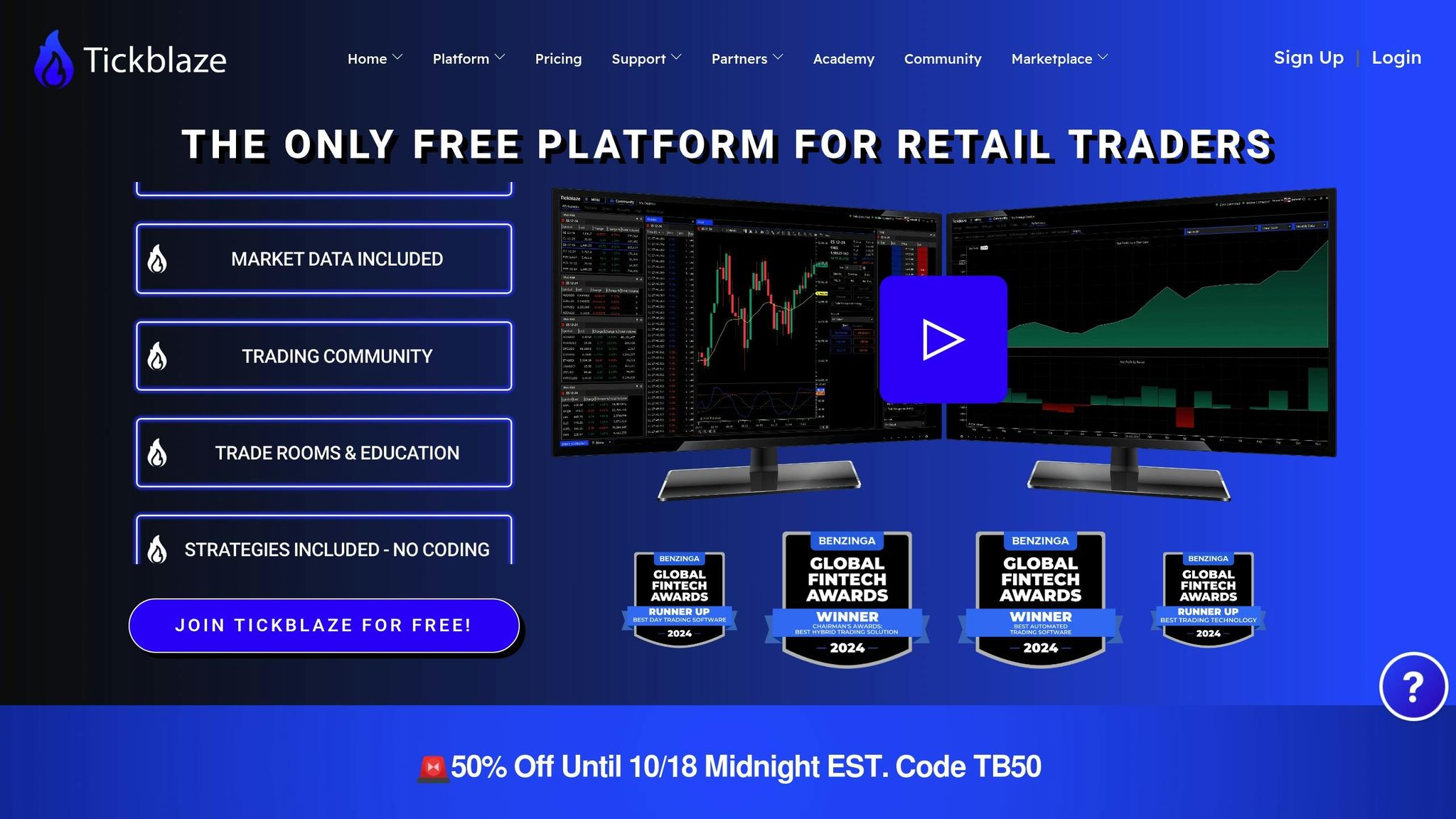
Tickblaze earns its spot in the 2025 lineup of automated trading systems. While specific details about its features and the asset classes it supports are scarce, you can explore its official resources to stay updated on the latest developments.
Up next, let’s take a closer look at StrategyQuant X, another standout system in this lineup.
9. StrategyQuant X
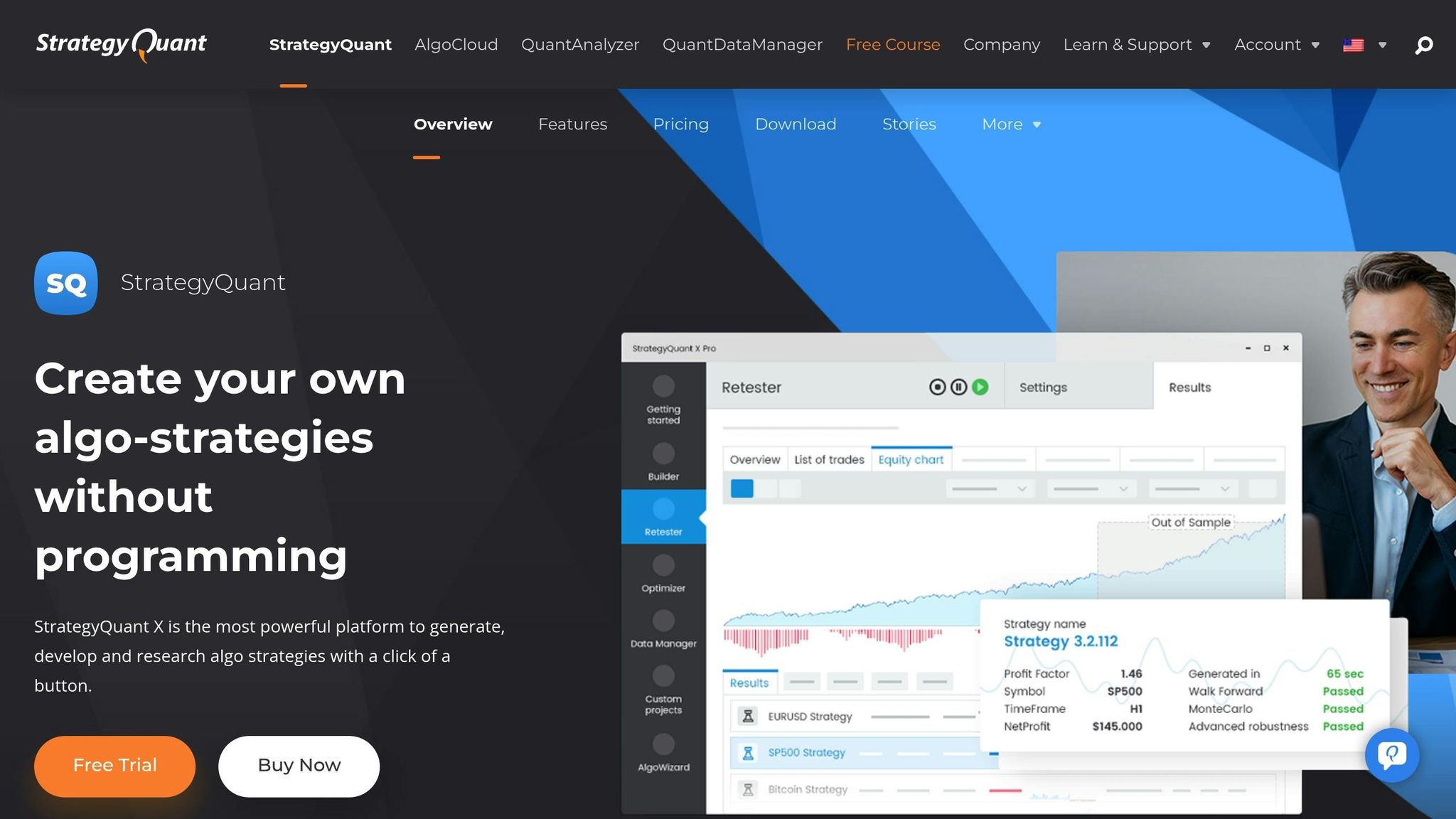
Information about StrategyQuant X’s capabilities in automating futures trading is somewhat limited. There isn’t much publicly available detail about its approach to strategy creation, testing processes, or support for multiple asset classes. This limited documentation suggests that StrategyQuant X is still carving out its place in the trading landscape.
On the other hand, Bookmap takes a different route, offering a unique perspective on futures trading through its advanced order book visualization tools.
10. Bookmap
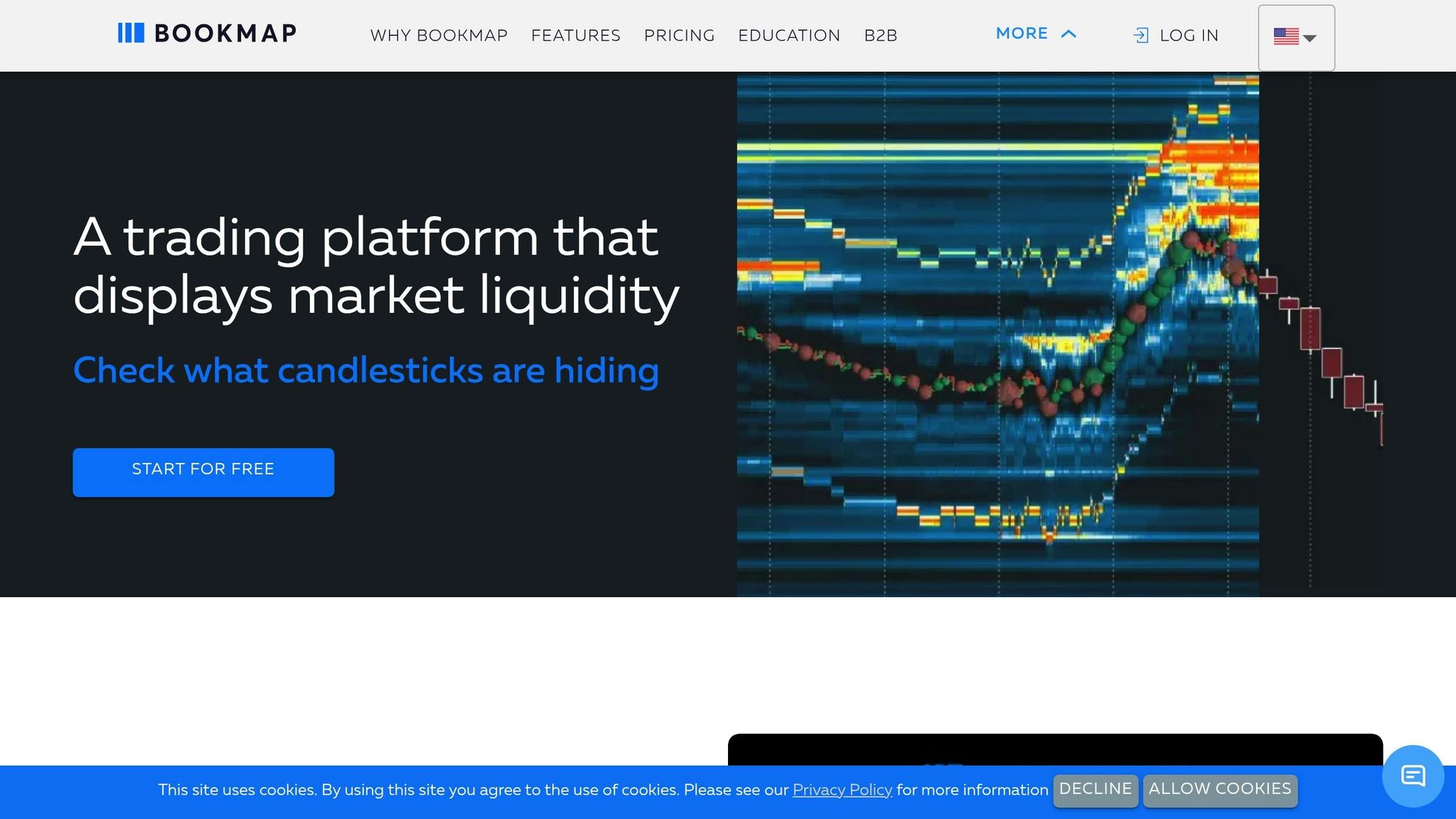
Bookmap is a cutting-edge platform designed to visualize the order book for futures trading. It transforms the constant flow of real-time order data into a dynamic heat map, offering traders a clear picture of the live auction process. By combining this with historical depth-of-market data, Bookmap provides traders with a sharper perspective, helping them better anticipate short-term price movements.
Supported Asset Classes
Bookmap is tailored specifically for futures trading, offering tools that align well with this market’s needs. It also supports micro futures, making it easier for traders to access major markets with less capital investment.
Data Connectivity and Pricing
The platform connects seamlessly with top-tier data providers like Rithmic, CQG, TT, and GAIN Futures, ensuring traders have access to high-quality market data. Bookmap is available for $99 per month, offering advanced tools to analyze order flow and improve trading decisions.
11. Jigsaw Trading
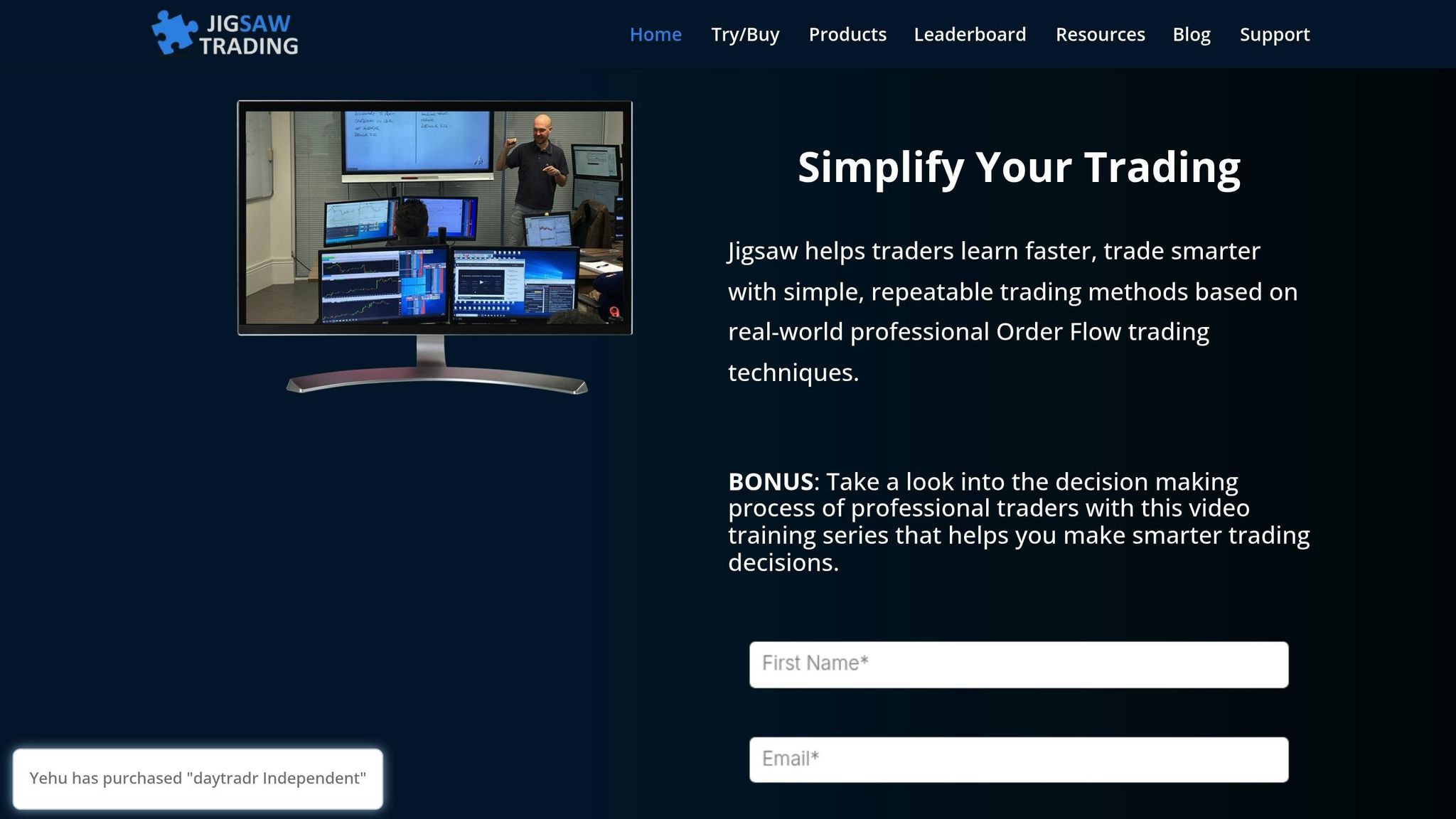
Jigsaw Trading is a platform tailored for traders who prioritize order flow analysis and tape reading – skills crucial for professional scalpers and proprietary trading firms. Its standout features include advanced Depth of Market (DOM) interfaces and detailed tape-reading tools, designed to help traders grasp market microstructure and execute trades with precision.
Supported Asset Classes
This platform is primarily geared toward the futures markets, where order flow analysis proves especially useful. It shines in high-volume contracts like the E-mini S&P 500 (ES), E-mini NASDAQ (NQ), and key commodity futures. These markets demand a deep understanding of the dynamics between buyers and sellers, making Jigsaw Trading an excellent choice for scalpers looking for precise execution in these environments.
Order Execution and Latency Performance
Jigsaw Trading integrates professional-grade data feeds, such as Rithmic and CQG, to deliver ultra-low latency execution – essential for rapid scalping. The platform’s order management system supports features like one-click order placement and advanced bracket orders, enabling quick and efficient trading. Its Depth Trader interface allows traders to place orders directly on the DOM, with instant visual feedback on fills and position updates. This streamlined process ensures minimal delays, even in fast-moving markets, giving traders a competitive edge.
Tools for Analysis and Trading Strategy Optimization
The platform’s analytical tools are headlined by Auction Vista, which provides real-time visualization of buying and selling pressure using color-coded price levels. This tool helps traders pinpoint potential support and resistance areas based on live order flow data. Another standout feature, Reconstructor, offers a tick-by-tick replay of market sessions, enabling traders to study how order flow evolves around key price levels. Additionally, footprint charts present volume data at each price level, helping traders identify patterns like absorption, exhaustion, and continuation – critical insights for refining trading strategies.
12. ATAS (Advanced Time and Sales)
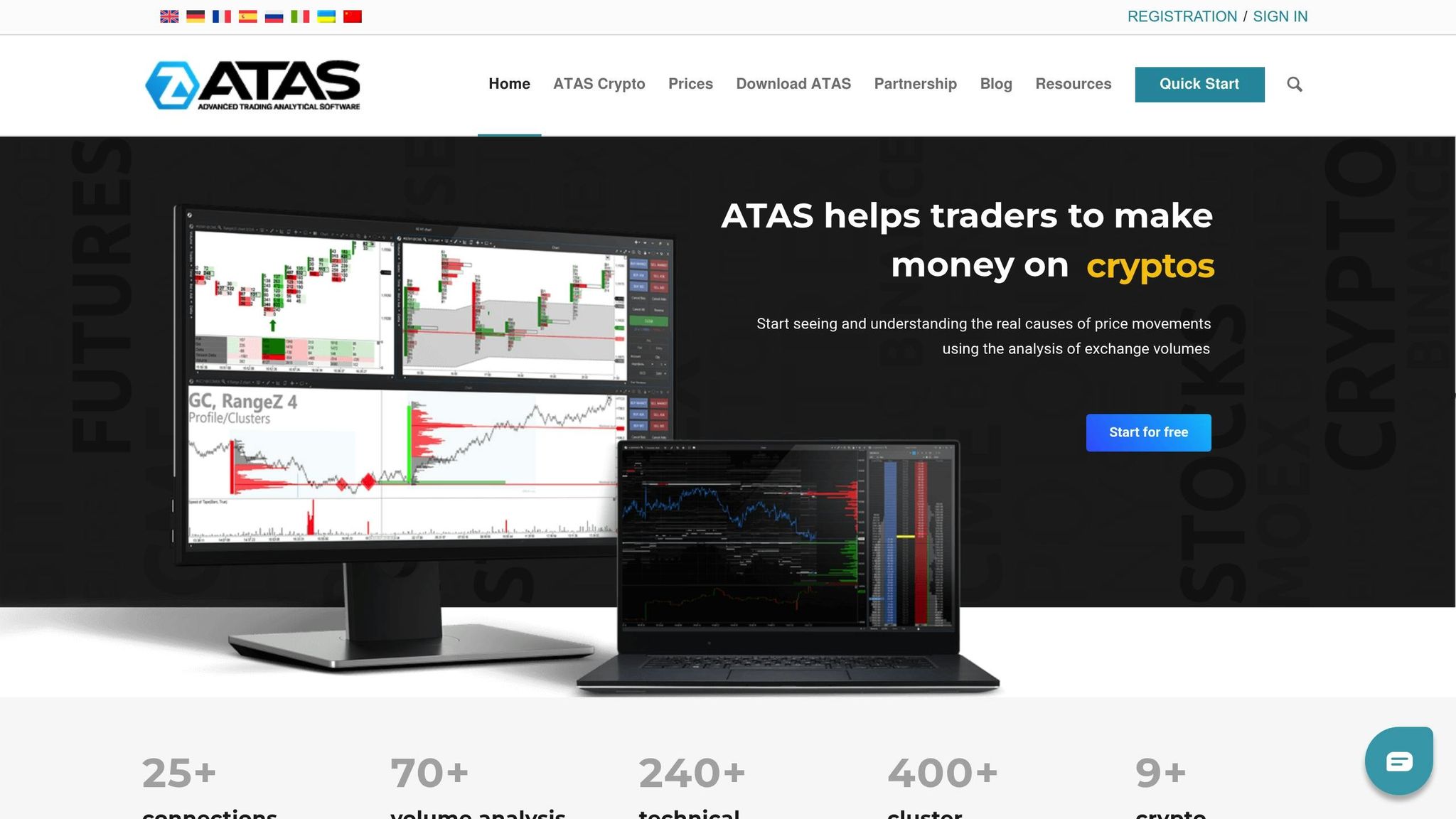
ATAS is a cutting-edge futures trading platform trusted by professional traders and proprietary trading firms around the globe.
Supported Asset Classes
The platform offers access to a wide range of futures market data through partnerships with top-tier data providers like Rithmic, CQG, CTS, and Gain Futures.
Order Execution and Data Integration
ATAS connects seamlessly with brokers such as Optimus Futures, delivering real-time streaming quotes and historical market data straight from the exchanges. This efficient data flow powers its standout cluster analysis tool, which helps traders make sense of order flow and fine-tune their trading strategies.
Subscriptions for ATAS start at $69 per month.
13. MetaTrader 4 (MT4)
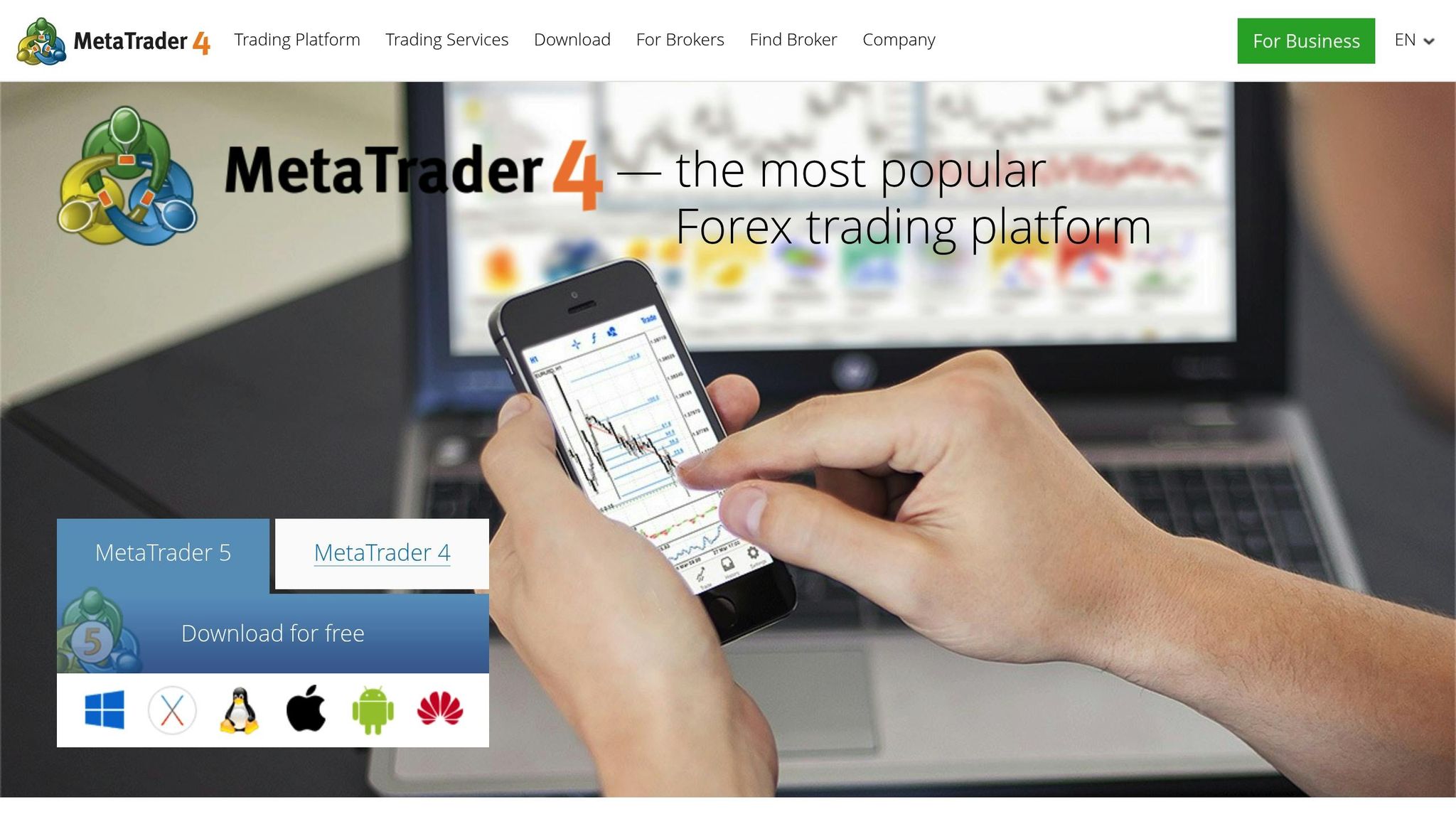
MetaTrader 4 (MT4), launched in 2005, has been a go-to trading platform for over 16 million users worldwide. Its reputation stems from its ease of use and its standout feature: automation through Expert Advisors (EAs).
Automation Features
MT4 stands out for its ability to automate trading using Expert Advisors (EAs) and the MQL4 programming language. This allows traders to automate trade execution and manage positions seamlessly. The platform also supports scripts for performing one-time tasks and provides access to a marketplace with over 1,700 trading robots and 2,100 indicators. For those looking to fine-tune their algorithms, MT4 includes an integrated Strategy Tester. Pairing MT4 with a Virtual Private Server (VPS) ensures uninterrupted 24/7 operation. While forex trading remains its core, MT4 has expanded to support additional asset classes over the years.
Supported Asset Classes
Initially built for forex trading, MT4 now supports futures trading as well. Many brokers offer access to major indices, commodities, and currency futures through the platform, making it a versatile choice for traders interested in automated futures trading.
Order Execution and Latency Performance
MT4 integrates directly with brokers to ensure reliable order execution. However, execution speed depends heavily on the broker’s infrastructure and the proximity of their servers. Many traders prioritize brokers with low-latency connections to ensure efficient futures trading.
Tools for Analysis and Trading Strategy Optimization
MT4’s Strategy Tester is a powerful tool for optimizing EA parameters. By using historical data, traders can identify the most effective configurations for their automated strategies. Additionally, the MQL4 programming environment includes a built-in editor equipped with debugging tools, making it approachable for traders who want to design custom indicators or tweak existing EAs to better suit their needs.
14. MetaTrader 5 (MT5)
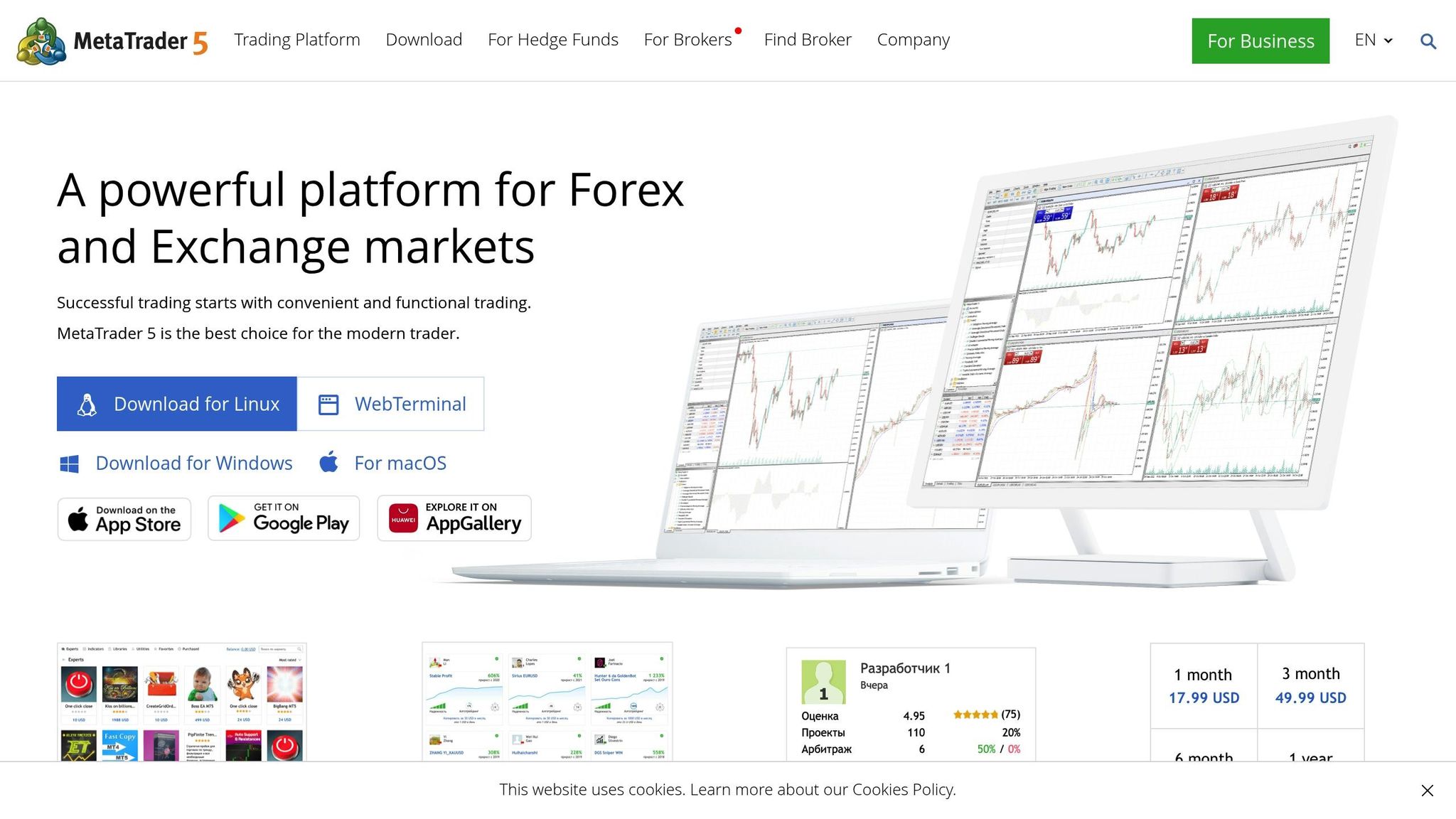
MetaTrader 5 (MT5) is a free platform designed to streamline automated futures trading. Known for its advanced features and access to a wide range of markets, it’s a go-to solution for traders aiming to enhance their trading strategies.
Automation Features
MT5 is powered by the optimized MQL5 language, enabling fast execution of Expert Advisors and support for all order types. This flexibility ensures traders can adapt to various market conditions with ease. The platform’s design ensures trading robots and automated systems operate at high speeds, making it a reliable choice for quick trade execution.
Supported Asset Classes
While MT5 is well-known for forex trading, it also serves as a robust platform for futures trading. By leveraging GAIN Futures as its data feed, it provides dependable market data, making it an effective tool for automated futures trading.
Order Execution and Latency Performance
MT5’s architecture is tailored for high-speed order execution, allowing it to handle multiple trades simultaneously. This is particularly beneficial for high-frequency trading strategies, as its refined processing engine minimizes the delay between signal generation and order placement.
Tools for Analysis and Strategy Optimization
The platform comes equipped with a wide array of tools for both technical and fundamental analysis, including Market Depth for a detailed view of market conditions. Its upgraded strategy testing environment supports faster backtesting and deeper optimization, helping traders refine their approaches. Additionally, MT5’s cross-platform accessibility ensures users can monitor and adjust their trades from smartphones, browsers, and desktop devices.
15. Interactive Brokers (IBKR)
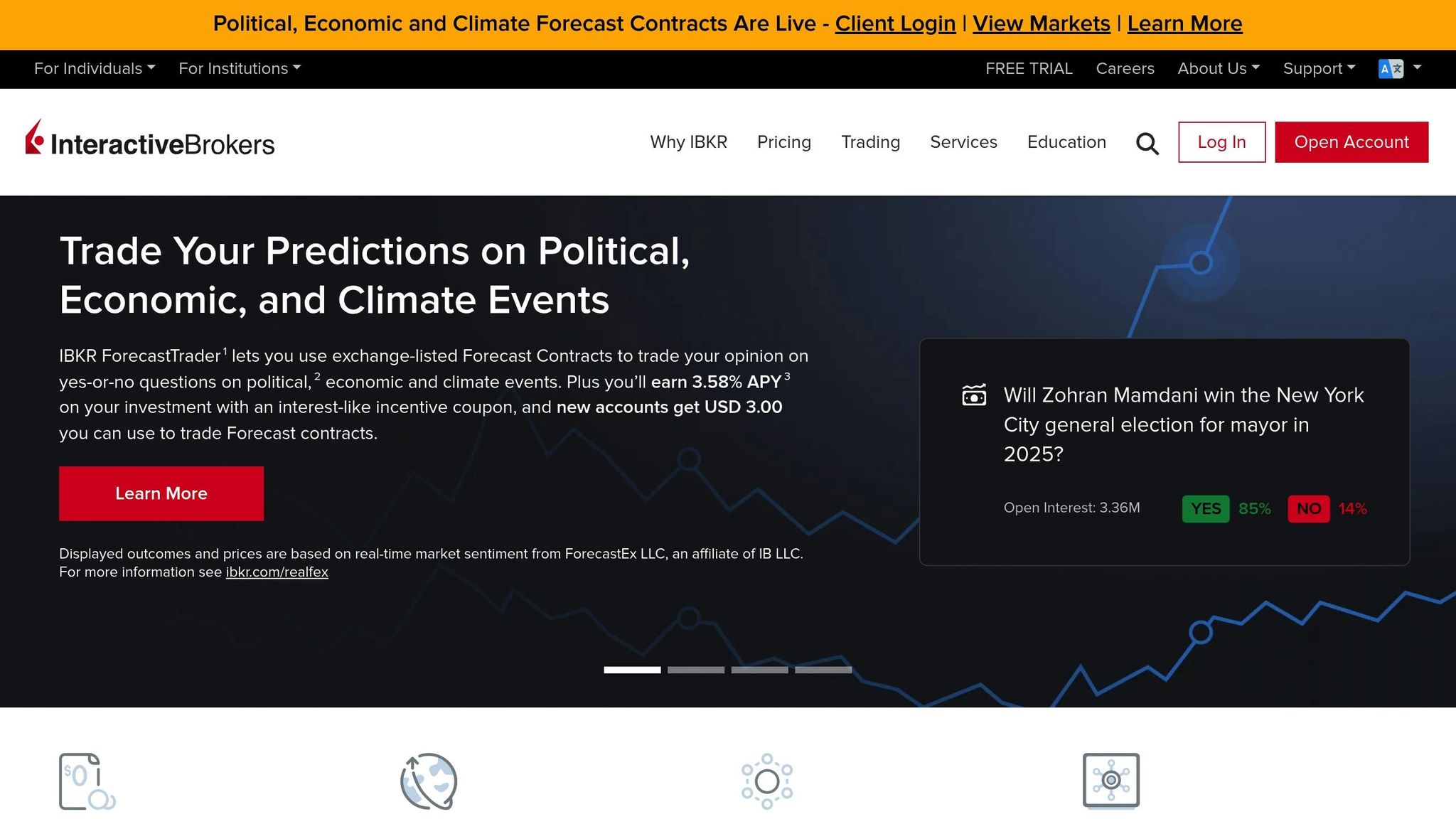
Interactive Brokers (IBKR) is a standout platform tailored for both professional and active traders, offering institutional-grade tools and access to a broad range of global markets. With its comprehensive API support, IBKR caters to individual traders and institutions alike, providing direct market access to multiple international exchanges for futures, forex, and equities.
Automation Features
The backbone of IBKR’s automation capabilities lies in its Trader Workstation (TWS) API, which supports multiple programming languages like Python, Java, C++, and .NET. This API enables real-time data streaming, order management, and portfolio monitoring, making it a powerful tool for traders who want to automate their strategies.
IBKR integrates seamlessly with leading automation tools, giving users the flexibility to leverage its execution capabilities while working in their preferred development environments. For high-frequency trading, the FIX API offers institutional-level connectivity with low-latency order routing.
Additionally, IBKR’s Algo Orders feature provides pre-built algorithmic trading strategies such as TWAP (Time Weighted Average Price), VWAP (Volume Weighted Average Price), and Iceberg orders. These strategies are designed to help traders execute large orders efficiently, minimizing market impact while maintaining precision.
Supported Asset Classes
Interactive Brokers covers a wide variety of asset classes, making it one of the most versatile platforms available. The platform provides access to futures contracts from major exchanges like CME, CBOT, NYMEX, and ICE, offering instruments ranging from agricultural commodities to financial indices.
Forex traders can choose from a broad selection of currency pairs with competitive pricing. Beyond forex, IBKR supports trading in stocks, ETFs, options, bonds, and cryptocurrencies, offering something for every type of trader. Its bond trading options include government, corporate, and municipal bonds, providing opportunities for portfolio diversification.
Order Execution and Latency Performance
IBKR’s SmartRouting technology ensures traders get the best prices by instantly scanning multiple market centers. For those who need greater control, the Direct Market Access (DMA) feature allows users to route orders directly to specific exchanges.
To cater to traders with speed-intensive strategies, IBKR offers co-location services, placing its servers within exchange data centers. This setup minimizes latency and ensures ultra-fast execution for the most demanding trading needs.
Tools for Analysis and Strategy Optimization
IBKR doesn’t just focus on execution – it also equips traders with a suite of advanced tools for analysis and strategy development. The Trader Workstation comes with robust charting features, including technical indicators and drawing tools, to help traders analyze market trends effectively.
For risk management and performance tracking, tools like Risk Navigator and PortfolioAnalyst provide real-time insights. These include value at risk (VaR) calculations, stress testing scenarios, and detailed performance metrics.
Options traders can take advantage of the Options Strategy Lab, which simplifies the creation and analysis of complex multi-leg options strategies. It includes features like profit/loss visualization and Greeks analysis to help traders refine their approach.
Futures traders aren’t left out either. Real-time margin calculations show how position changes will impact account requirements. Meanwhile, the Market Scanner lets users create custom screens based on technical, fundamental, or options-related criteria, generating alerts when specific conditions are met. This combination of tools ensures that traders have everything they need to optimize their strategies and stay ahead of the curve.
16. MotiveWave
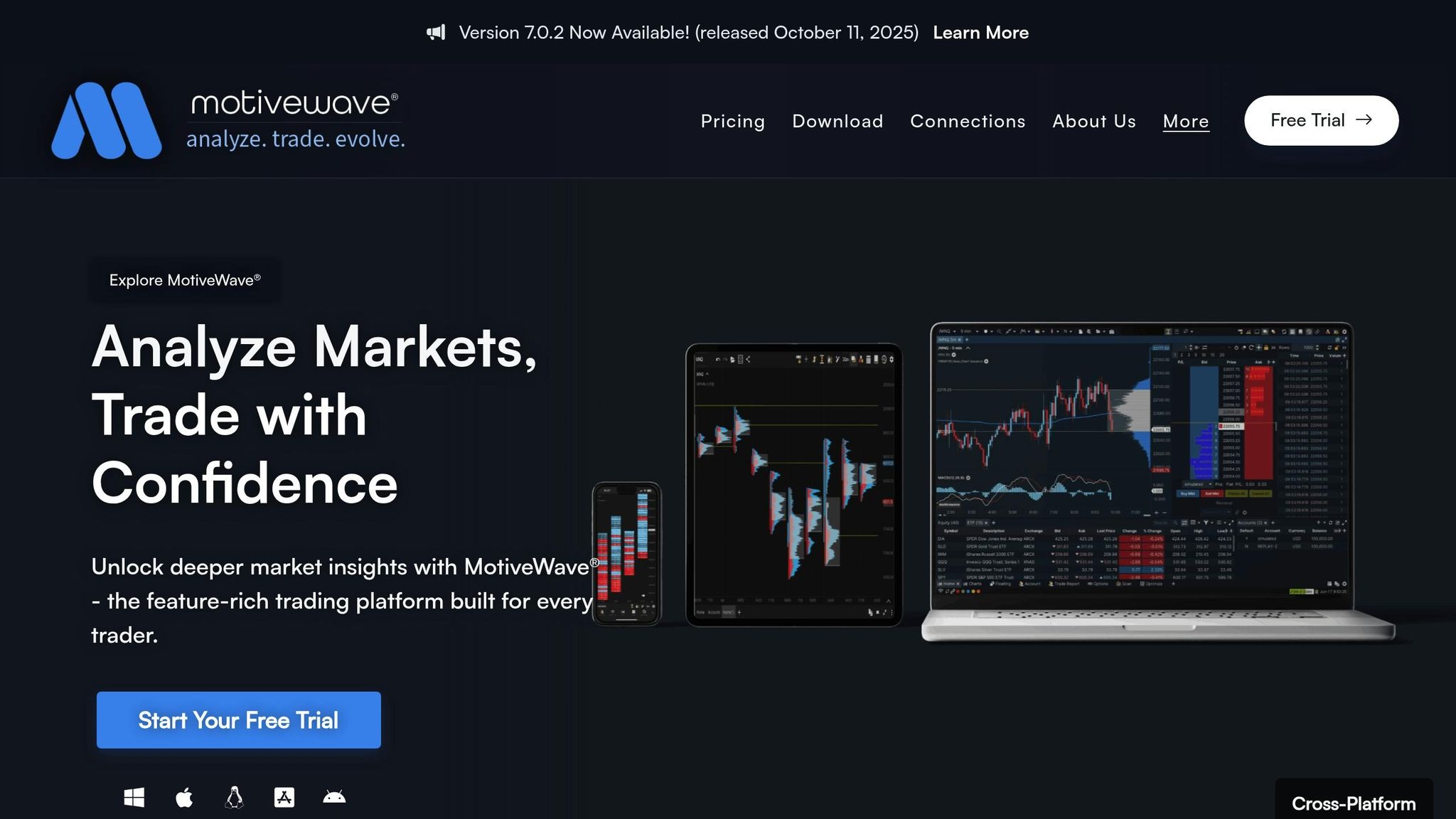
MotiveWave is a charting and trading platform designed with a specific focus on Elliott Wave theory and harmonic pattern recognition, making it a go-to choice for futures traders. Packed with advanced analytical tools, it’s tailored for those who rely heavily on detailed chart analysis to navigate the futures markets. Let’s take a closer look at its supported assets and standout features.
Supported Asset Classes
MotiveWave is built with futures traders in mind. It integrates seamlessly with Rithmic and CQG data feeds, ensuring access to reliable, real-time market data. This opens the door to a wide range of futures markets, including:
- Agricultural commodities
- Energy products
- Metals
- Financial instruments
This specialized focus aligns perfectly with traders who use methods like Elliott Wave theory to analyze market trends and make informed decisions.
Tools for Analysis and Strategy Optimization
What sets MotiveWave apart is its robust suite of technical analysis tools. It offers an impressive array of features designed to help traders identify key market movements, including:
- A vast selection of technical indicators
- Customizable chart layouts for tailored analysis
- Advanced backtesting tools to refine trading strategies
Additionally, its drawing tools allow traders to annotate charts and highlight wave structures, blending manual insights with systematic analysis. This combination of flexibility and precision makes it an invaluable tool for serious traders.
For just $29 per month, MotiveWave provides access to professional-grade tools that elevate futures trading strategies.
17. Tradovate
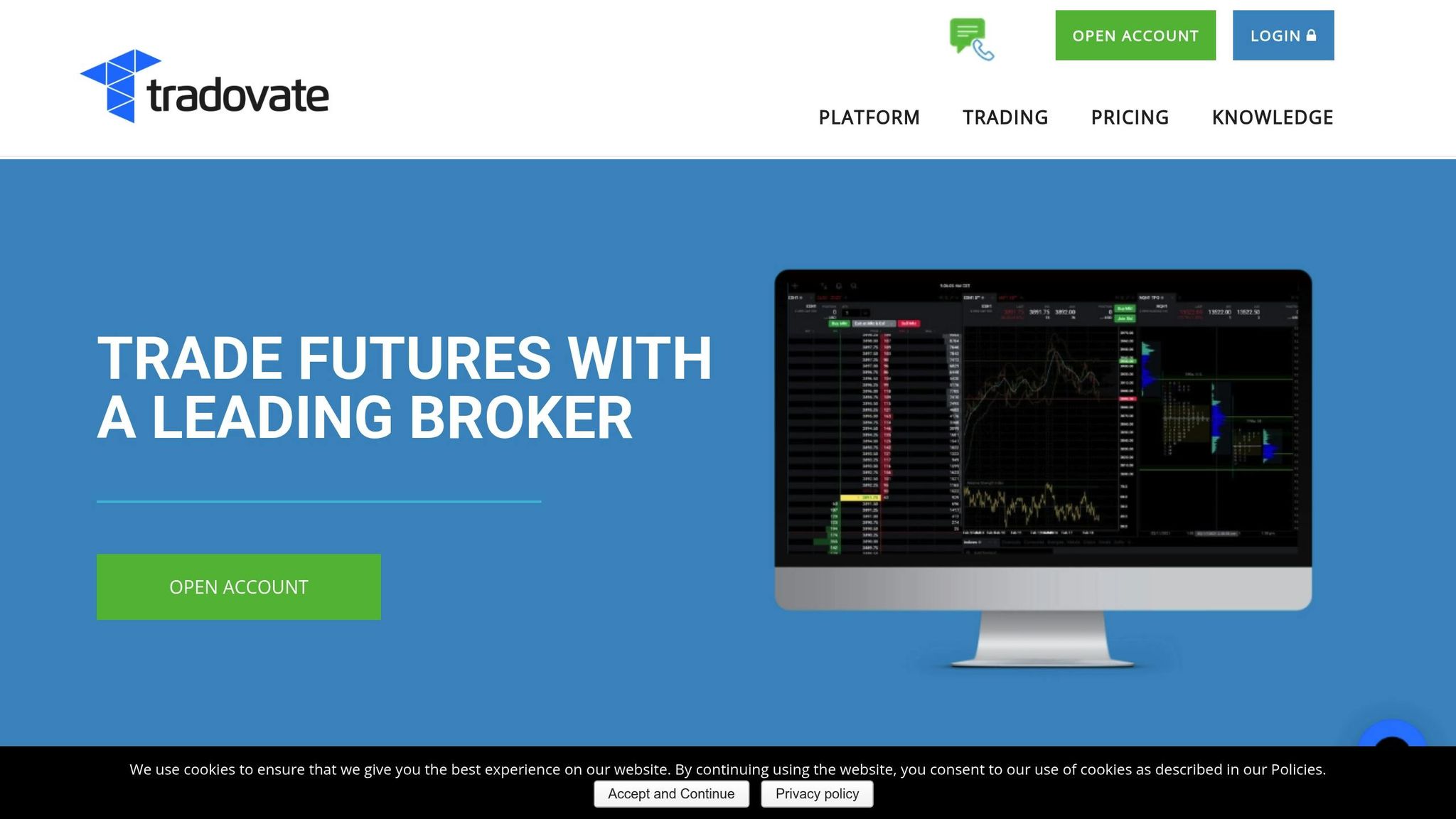
Tradovate is a cloud-based platform tailored for futures trading, offering speed and seamless multi-device functionality. Built with active futures traders in mind, it delivers top-tier execution and dependable performance.
Order Execution and Latency Performance
Tradovate’s technology is all about speed and reliability. Its cloud-based order management system securely stores all orders on the server, ensuring your trades aren’t affected by local computer issues or internet outages.
"Tradovate’s cloud-based platform holds all orders either securely at the exchange or server-side, never on your device. Trade confidently knowing that a computer crash or internet disruption will not cause your exit orders or strategies to fail." – Tradovate
The platform also features a specialized Depth of Market (DOM) module designed for quick execution. With one-click order entry and customizable hotkeys, traders can act on opportunities instantly. This emphasis on fast and reliable execution makes Tradovate a go-to choice for modern automated futures trading.
Platform Comparison Table
When it comes to futures trading platforms, finding the right fit depends on your trading style, technical needs, and automation goals. Below is a detailed comparison to help you zero in on the platform that aligns with your requirements.
| Platform | Automation Support | Primary Asset Classes | VPS Integration | Key Advantages | Best For |
|---|---|---|---|---|---|
| QuantVPS | Full platform support | All (hosting service) | Native VPS | 0-1ms latency, 100% uptime, multi-monitor support | Hosting automated strategies |
| NinjaTrader | NinjaScript (C#) | Futures, Forex, Stocks | ✅ Yes | Ultra-low latency, deep broker integration | Retail algorithmic trading |
| Quantower | API automation | Multi-asset | ✅ Yes | Sleek interface, dozens of broker connections | Multi-asset automation |
| TradeStation | EasyLanguage | Futures, Stocks, Options | ✅ Yes | Institutional-grade execution, powerful backtesting | Active traders with coding skills |
| Sierra Chart | C++ scripting | Futures focus | ✅ Yes | Professional-grade, ultra-responsive order flow | Precision execution trading |
| MultiCharts | PowerLanguage | Futures, Equities | ✅ Yes | Advanced automation environment | Serious system developers |
| Optimus Futures | Platform-dependent | Futures | ✅ Yes | Access to multiple platforms (NinjaTrader, Quantower) | High-performance futures trading |
| Tickblaze | Multi-broker APIs | Multiple assets | ✅ Yes | Quantitative research suite, portfolio testing | Professional algo deployment |
| StrategyQuant X | AI-driven automation | Futures, Forex, Indices | ✅ Yes | Automatic strategy generation and optimization | AI-powered strategy development |
| Bookmap | Semi-automated | Futures focus | ✅ Yes | Order book visualization, liquidity heatmaps | Discretionary + automated trading |
| Jigsaw Trading | Limited automation | Futures | ✅ Yes | Advanced DOM, tape-reading interfaces | Professional scalpers |
| ATAS | Analysis-focused | Futures | ✅ Yes | Order flow analysis, footprint charts | Volume and order flow analysis |
| MetaTrader 4 | Expert Advisors (MQL4) | Forex, CFDs | ✅ Yes | Thousands of EAs, extensive broker support | Forex automation |
| MetaTrader 5 | Expert Advisors (MQL5) | Multi-asset | ✅ Yes | Faster backtesting, modernized scripting | Advanced forex/CFD automation |
| Interactive Brokers | API support | Global multi-asset | ✅ Yes | Institutional-grade, global market access | Institutional trading |
| MotiveWave | Full automation | Multiple assets | ✅ Yes | Elliott Wave analysis, harmonic patterns | Technical analysis automation |
| Tradovate | Limited automation | Futures | ✅ Yes | Cloud-based, commission-free, mobile access | Modern futures trading |
Every platform supports VPS deployment, with QuantVPS offering optimized hosting for lightning-fast performance at 0-1ms latency. Whether you’re looking for basic scripting tools or a sophisticated algorithmic environment, this table highlights platforms tailored for diverse needs. Some excel in multi-asset versatility, while others specialize in futures trading. Choose wisely to align with your automated trading goals.
Conclusion
The futures trading world in 2025 presents plenty of opportunities for both discretionary and automated traders. However, success depends on aligning your strategy with the right technology. Whether you’re running straightforward moving average crossovers or intricate machine learning models, the platform you choose can significantly impact your trading outcomes.
Your trading style also plays a key role in picking the right tools. Scalpers and day traders will benefit from platforms like Sierra Chart, Jigsaw Trading, or ATAS, which provide millisecond-level execution and detailed order flow visualization – perfect for short-term trading. On the other hand, systematic traders who build custom strategies might find NinjaTrader, MultiCharts, or TradeStation better suited to their needs, thanks to their advanced scripting tools and thorough backtesting options.
For those handling multiple asset classes, platforms like Quantower and Interactive Brokers offer the flexibility to trade across futures, forex, and equities seamlessly. And for AI-driven strategy developers, StrategyQuant X opens doors to creating and optimizing trading systems without requiring deep coding expertise.
Even with the best platform, top-tier hosting is essential to ensure peak performance. This is where QuantVPS becomes indispensable. It provides the high-performance infrastructure that allows platforms like NinjaTrader, MetaTrader, and TradeStation to operate at their best. Without reliable hosting, even the most advanced trading systems can falter in today’s fast-paced markets.
Ultimately, in automated trading, reliability and consistency are more than just desirable – they’re the difference between turning a profit and taking a loss. Advanced technology is only as powerful as the infrastructure supporting it.
FAQs
What features should I prioritize when choosing a futures trading platform in 2025?
When you’re picking a futures trading platform in 2025, keep an eye on low costs – think competitive margin rates and minimal commissions. These can make a real difference in boosting your returns over time. You’ll also want to look for platforms that offer advanced tools like customizable charting, real-time data analysis, and seamless options for automating your trading strategies.
Equally important is finding a platform with multi-device compatibility. This ensures you can switch effortlessly between desktop, web, and mobile devices without missing a beat. And don’t overlook the value of educational resources – they can help sharpen your trading skills and keep you updated on market trends. Platforms with these features can take your trading game to the next level.
How can VPS hosting improve the performance of automated trading strategies?
VPS (Virtual Private Server) hosting can play a crucial role in boosting the performance of automated trading strategies by offering a stable and optimized setup for executing trades. Hosting your trading platform on a VPS ensures low-latency connections, which means your orders are executed faster, minimizing the chances of slippage during unpredictable market swings.
Another advantage is the 24/7 uptime that VPS hosting delivers. This means your automated strategies can keep running without interruptions, even if your local power goes out or your internet connection drops. So, even when your personal device is offline, your trading algorithms stay active and consistent. On top of that, VPS hosting provides a dedicated and secure environment, helping to prevent system crashes and external disruptions – key factors in safeguarding the reliability of your trading operations.
What should traders consider when selecting between platforms like NinjaTrader, TradeStation, and MultiCharts for algorithmic trading?
When choosing between platforms like NinjaTrader, TradeStation, and MultiCharts for algorithmic trading, it’s important to match the platform’s features with your trading style and goals.
- NinjaTrader stands out for futures traders who prioritize flexibility. It offers advanced backtesting tools and strategy automation using NinjaScript, making it highly customizable.
- TradeStation delivers institutional-level execution, strong backtesting features, and supports EasyLanguage scripting, making it a solid option for traders who want a comprehensive, all-in-one solution.
- MultiCharts is tailored for experienced system developers, providing a sophisticated automation framework and compatibility with EasyLanguage through PowerLanguage.
Your decision should factor in the types of markets you trade, your scripting preferences, and how much automation your trading strategies require.








